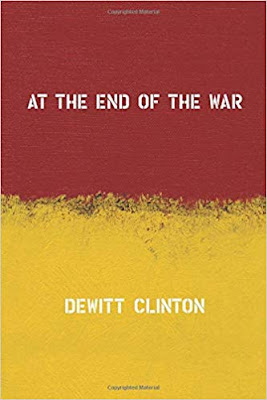At The End Of The War
by DeWitt Clinton
© 2018 DeWitt Clinton
Kelsay Books
Aldrich Press
ISBN 978-1—947465-92-3
Softbound, 111 pages,
No Price Given
Review by Zvi A. Sesling
The
Holocaust is 80 years in the past and survivors have decreased in
large numbers. But deniers of that terrible period have increasingly spread their message to countries throughout the world.
In this
toxic atmosphere DeWitt Clinton’s poem, “Touring the Holocaust”
is more than a reminder; it is a tribute to the past and those who
died.
Following
are excerpts from this poem “Opening Day, The United States
Holocaust Museum.” While the poem is five plus pages long, I
present excerpts depicting the prejudice and bigotry unleashed
against the Jews.
We cannot
move any further
unless we step
into a care
a brown cattle
car
swept
incredibly clean
where all of us
must
unload nothing
bad will happen
to us here
though we
cannot stay
too long
in the car
that
would bring the guards
everyone
believes
we will
be safe
it isn’t
as if
we are
really there.
And the
people on the tour years later see what the camp was like. The truth
may frighten. The truth may reveal. Those in the present do not die
like those who died in the death camps.
What is
it like for a town and its people to be wiped off the face of the
earth? Clinton captures this tragedy of the many small shtetls
which existed, in some cases for hundreds of years, before being
exterminated by the German soldiers and their accomplices.
Dazed,
disoriented, we step
into a
shtetl sky high
a room of old
photos
of everyone who
ever
lived in that
place
this fire
place high as a smokestack
those at the
very top
lift
first into ash.
Finally
we approach
the
crematorium
a model
of long courteous lines
little
people with
little
faces
guards
and shepherds
keeping
everyone
civil, in line.
We watch them
go inside
watch
them undress
the
inappropriateness
of men and
women
long beards
pubic hair
a
wildness beyond even G-d
Clinton
has brought readers through the Holocaust Museum to the reality of
the actual brutality as it was perpetrated in the 1930s and 1940s.
His poems portray what the Jews experienced. He shows a sensitivity
to biblical literature as well as Judaism. Each poem reveals the
horror of the war as well as the cruelty and viciousness of the
Nazis.
“Reading
the Tao at Auschwitz” is a 28 part sequence which begins thus:
I
In the
beginning we saw Nothing
From
Nothing came Something
Something made
All of us
Turn into ash
only to
Float
onto those just Arrived
or on farmers,
nearby,
Turning
us into Soil and Food
The irony
of death, of ashes of humans becoming food is not missed either by
Clinton or his readers. How Nothing becomes Something is the tragedy
– of which there are many -- of World War II and the Holocaust.
The third
part portrays another tragedy, the treating of humans like cows or
sheep led to slaughter:
III
Imagine,
go ahead imagine
Undressing a
place
Where
signs direct
Everyone to
Remember your number
To be
efficient, your number is used again
In Part X
the helplessness of the Jews is laid out in twenty-three lines. Many
of the things Jewish prisoners needed are listed-- food and help the
most prominent.
X
The
way never acts yet nothing is left undone.
--I, xxxvii
We needed
soup
We needed
clothes
We needed
penicillin
We needed
cots
We needed
mothers
We needed water
We needed more
soup
We needed
flannels
We needed
air
We needed guns
We needed
prayer
We needed
Benji
We needed Marla
We needed all
we ever knew
We needed
law
We needed
time
We needed
home
We needed stew
We needed
health
We needed Moses
We needed bombs
We needed meals
We needed You
Clinton’s
book is a masterpiece of understanding and presenting the Holocaust
in real terms. He refutes the deniers for their anti-Semitic
beliefs and their nefarious political purposes.
As
Professor Emeritus of English at the University of
Wisconsin-Whitewater, I am hoping that he taught his students about
the Holocaust during his long career and that they have retained his
lessons and passed them forward. That is what keeps the truth ahead
of the deniers.
At The
End Of The War is a book of poetry to be
read by everyone.
______________________________________
Zvi A. Sesling
Editor, Muddy
River Poetry Review
Author, War
Zones (Nixes Mate Books)
Author, The
Lynching of Leo Frank (Big Table
Publishing)




































No comments:
Post a Comment